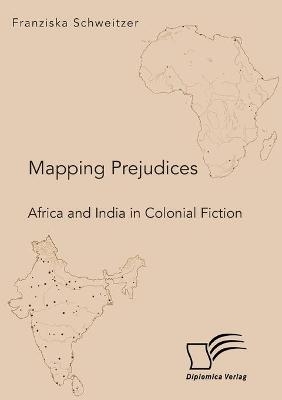
Mapping Prejudices. Africa and India in Colonial Fiction
Diplomica Verlag
978-3-96146-850-8 (ISBN)
Franziska Schweitzer, M.A., kam schon als Jugendliche mit Indien in Berührung und nahm an einem lokalen Austauschprogramm teil. 2010 begann sie ihr Studium der British Studies (Hauptfach) und Indologie (Nebenfach), das sie wieder, dieses Mal für ein ganzes Semester, nach Indien führte. Immer wieder stieß sie während des Studiums auf das Thema des Kolonialismus und auf dessen weiterhin prävalente Auswirkungen auf Politik, Wirtschaft, Kultur und besonders Vorurteile, die in der westlichen Welt noch immer Personen aus den ehemaligen Kolonien entgegenschlagen. Die im Studium behandelte Literatur legte die Vermutung nahe, dass die Darstellung der Landschaften Afrikas und Indiens in der Populärliteratur einen schwerwiegenden Einfluss auf die Rezeption der Kolonien in Europa hatte und zu generationenübergreifend perpetuierten Vorurteilen führte. Auch privat beschäftigte sich die Autorin mit den Themen des Kolonialismus und des Orientalismus und konnte dieses Wissen in den Text mit einbringen.
Textprobe:Kapitel 2.1. Describing the Indescribable:"So pervasive was the influence of the picturesque on landscape aesthetics that its tenets could be unyoked from specific associations. Travellers could eschew direct transcription from African landscape spaces into picturesque European scenes. Instead, they could acquire fluency in its vocabulary, deploying it on its own terms" (McAleer 70-71).As mentioned before, it is not unusual that the writer encounters landscapes, either while actually travelling or via photographs, that are alien to him. He is confronted with the problem of how to describe something that he has never seen before to people who have not seen it at all. Most writers resort to describing it with European imagery, particularly with the picturesque (McAleer 74) and the sublime: "In the late eighteenth century, the British politician Edmund Burke viewed India with both astonishment and also terror, 'ungraspable' in its sublimity" (Lehning 236). The writers revert to using sublime vocabulary because the picturesque vocabulary is not satisfactorily explaining the mountainous regions - e.g. the Himalayas or the Kilimanjaro in Africa. It "offered the possibility of differentiating while still retaining an aesthetic rein on the representation" (McAleer 77). The Victoria Falls are one, though often used, example of how the sublime was "adapted and employed extensively in the representation of a non-European, inherently unknown scene" (McAleer 86). It is evident, that the codifying of landscape has an effect on how a certain landscape is received by the reader, but it creates an image of a landscape that he might not have chosen, had he seen the Victoria Falls himself. The choice of the writer thus presents an image that may or may not faithfully represent what he has seen because it is codified within a discourse that not everybody adheres to in the same measure, which can sometimes blur the line between novel and romance for the reader. Smith makes a very good case for the difficulty of coding and decoding:an individual's perception of water depends on the ability to swim, and on cultural attitudes towards swimming, as much as it depends on the sound of splashing, the feeling of wetness, the sight of liquidity or the smell of seaweed. Given these 'sedimentations of later knowledge', we have a key, and with this key a pond is objectively a swimming place and on a hot summer's day it is literally beautiful. (82)Even though the intention might not coincide with the effect of the landscape description, for the writer it was nevertheless preferable to represent a codified landscape than not describing it at all. According to Lindy Stiebel, the desire to name is balanced against the "fear of not being able to name the foreign terrain, of not having the right words" (12). Again, the Victoria Falls are a perfect example of a landscape that has been described in the tradition of European discourse: "On first observing them, Livingstone produced the classic European response by attempting to relate them to known experiences and familiar features" (McAleer 78). This need to describe something new without having a suitable vocabulary seems to have had a strong prevalence throughout literature, for even the German Hermann Roskoschny takes note of the loss of words the writers describe: "'Die Zahl unserer Adjektive,' sagt Johnston, 'Ist zu dürftig, um den Pflanzenwuchs solcher Plätze wie Kissange annähernd zu schildern. Wir müssten in der Sprache Mittelafrikas reden, welche mitunter sieben verschiedene Ausdrücke für einzelne Gattungen der Waldgewächse hat'" (Kongogebiet 112). This quote could stem from Conrad's Marlow, who also has trouble describing what he sees (McClintock 44). The "horror of the inarticulate" is an evocation of the native or colonised land as "'the quintessence of mystery, as inarticulateness itself'" (Böhmer qtd in Stiebel 12). In most cases, these difficulties are overcome by a terminology that the a
| Erscheinungsdatum | 30.06.2021 |
|---|---|
| Sprache | deutsch |
| Maße | 155 x 220 mm |
| Gewicht | 166 g |
| Themenwelt | Geisteswissenschaften ► Sprach- / Literaturwissenschaft ► Anglistik / Amerikanistik |
| Geisteswissenschaften ► Sprach- / Literaturwissenschaft ► Sprachwissenschaft | |
| Schlagworte | Colonialism • Gender • Ideology • Landscape • Novel • Orientalism • Racism |
| ISBN-10 | 3-96146-850-8 / 3961468508 |
| ISBN-13 | 978-3-96146-850-8 / 9783961468508 |
| Zustand | Neuware |
| Haben Sie eine Frage zum Produkt? |
aus dem Bereich


